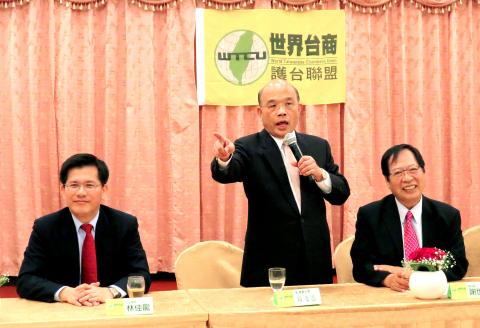The Democratic Progressive Party (DPP) yesterday called for President Ma Ying-jeou (馬英九) to apologize and step down over his low approval rating and what they said was his infringement of the Constitution amid the ongoing wiretapping controversy involving Legislative Speaker Wang Jin-pyng (王金平).
“We think that Ma is no longer fit to serve as president,” DPP Chairman Su Tseng-chang (蘇貞昌) said at a luncheon with Taiwanese businesspeople yesterday.
In 2007, Ma called on then-president Chen Shui-bian (陳水扁) to step down becuase his approval rating at the time had fallen to 18 percent, Su said, adding that Ma, who has an approval rating of 9.2 percent, should “practice what he preached.”

Photo: Chang Ching-ya, Taipei Times
The Ma administration has violated the principle of the separation of powers by allowing the Supreme Prosectors’ Office Special Investigation Division (SID) to abuse of its authority and wiretap members of the Legislative Yuan, Su said.
Most importantly, Ma, who pledged there would be no illegal or political wiretapping under his administration, broke his promise and should learn from former US president Richard Nixon, who offered his resignation following the Watergate scandal in 1972, by resigning, Su said.
Former DPP chairperson Tsai Ing-wen (蔡英文) echoed Su’s call, saying in a press release that Ma “should give serious thought to whether he is still suitable for the job.”
The judicial system’s abuse of power in the case has been obvious and Ma could also be involved in the scandal, which is why the fairness and independence of the Ministry of Justice’s special investigation panel is questionable, she said.
Tsai urged the suspension of judicial officials related to the case, including Prosecutor-General Huang Shih-ming (黃世銘), pending further investigation and called for a special committee to be established under the Legislative Yuan.
“President Ma should face his responsibility, and the people, with honesty because he was the one who sparked the political strife and the row is worse than the Watergate scandal, in terms of the abuse of power and the ensuing constitutional crisis,” Tsai said.
The DPP caucus told a press conference yesterday morning that the ministry’s special investigation panel would not be fair because Justice Minister Lo Ying-shay (羅瑩雪) already said that the SID’s wiretaps on the legislature were “unintentional.”
The DPP is going to call an international press conference today to address the wiretapping scandal and a party meeting to weigh in on its next appropriate step among the four available options of recall, impeachment, motion of no confidence and interpretation of the Constitution against the Ma administration, DPP caucus director-general Gao Jyh-peng (高志鵬) said.

CHAOS: Iranians took to the streets playing celebratory music after reports of Khamenei’s death on Saturday, while mourners also gathered in Tehran yesterday Iranian Supreme Leader Ayatollah Ali Khamenei was killed in a major attack on Iran launched by Israel and the US, throwing the future of the Islamic republic into doubt and raising the risk of regional instability. Iranian state television and the state-run IRNA news agency announced the 86-year-old’s death early yesterday. US President Donald Trump said it gave Iranians their “greatest chance” to “take back” their country. The announcements came after a joint US and Israeli aerial bombardment that targeted Iranian military and governmental sites. Trump said the “heavy and pinpoint bombing” would continue through the week or as long

TRUST: The KMT said it respected the US’ timing and considerations, and hoped it would continue to honor its commitments to helping Taiwan bolster its defenses and deterrence US President Donald Trump is delaying a multibillion-dollar arms sale to Taiwan to ensure his visit to Beijing is successful, a New York Times report said. The weapons sales package has stalled in the US Department of State, the report said, citing US officials it did not identify. The White House has told agencies not to push forward ahead of Trump’s meeting with Chinese President Xi Jinping (習近平), it said. The two last month held a phone call to discuss trade and geopolitical flashpoints ahead of the summit. Xi raised the Taiwan issue and urged the US to handle arms sales to

State-run CPC Corp, Taiwan (CPC, 台灣中油) yesterday said that it had confirmed on Saturday night with its liquefied natural gas (LNG) and crude oil suppliers that shipments are proceeding as scheduled and that domestic supplies remain unaffected. The CPC yesterday announced the gasoline and diesel prices will rise by NT$0.2 and NT$0.4 per liter, respectively, starting Monday, citing Middle East tensions and blizzards in the eastern United States. CPC also iterated it has been reducing the proportion of crude oil imports from the Middle East and diversifying its supply sources in the past few years in response to geopolitical risks, expanding

OTHER OPTIONS: Given possible US intervention and Taiwanese counterattacks, China might opt to blockade Taiwan or take its outlying islands instead of an all-out invasion A US think tank has urged Taiwan to adopt a “hellscape” strategy that would flood the Taiwan Strait with drones and other uncrewed systems to deter invasion by China. In its report, Hellscape for Taiwan, published on Thursday, the Center for a New American Security said Taipei’s asymmetric defense approach — often described as a “porcupine strategy” — needs to evolve to keep pace with the growing capabilities of the Chinese People’s Liberation Army. The “hellscape” strategy involves saturating the air and waters around Taiwan with thousands of drones and other platforms capable of striking invading forces from multiple domains at once. Long-range